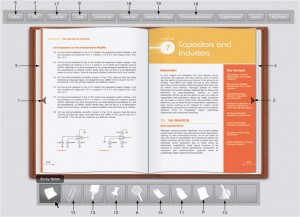Textbook Triumph – Electronic Book Operating System
Tech Blog Thursday mixes serious science with humor and easily recognizable analogies for the less-than-scientifically-inclined. The purpose of this blog series is to illustrate the potential of not-yet-commercialized technology and encourage excitement about the possibilities.
October 9, 2014

eBook OS – Architecture Design
Sometimes, a teaching assistant is all a student can turn to in the quest for gold—a good grade in a tough course. A bona fide professor is ideal, but it can be challenging for them to have enough time to speak with all of their students one-on-one.
As an archaeology student in a class taught by Dr. Henry Jones, you might have heard from students who’ve taken his classes before that he’s rarely there. But the other option for the required credits isn’t much better; River Song has issues with time management too.
If you’re interested in Genetics, the class taught by Professor Xavier is well-reviewed on RateMyProfessor.com, that is, if he’s not busy with political business.
Students with a mind for technical subjects who sign up for Transfiguration with Professor Dumbledore (often away from campus for “important business”) have said he seems better-suited for an administrative role.
Word on the street says taking Paleontology with Dr. Ross Geller is a bad decision. He’s always at a coffee shop in Manhattan, talking with his friends and often talking about “a break.”
Professor Plum spends a suspicious amount of time in the library, and Professor Abraham Van Helsing didn’t prioritize his teaching time either.
In cases like these, a TA often steps in and does their best to teach the material like the professor would, but they may only be a small step ahead of the students they need to teach, and buried under a mountain of their own studying to do as a graduate student.
Take heart, overworked teaching assistants! There’s a new, patented textbook that’s going to take care of everything for you. The technology, from your friendly neighborhood UCF, is a student-instructor learning environment that simplifies technical concepts and learning material with immediate answers to complex equations, a learning environment that engineering and science students can also use as a design tool.
The new electronic book operating system, eBOS, looks and functions like a printed book through flipped pages, bookmarks, highlighting, and notes. The technology is hardware-independent and cross-platform capable.
The “real book” look of eBOS can encourage students to use their textbook, and the advanced features mean material can be adapted based on difficulty levels and solution methods.
Students won’t have to bother the stressed TA when their textbook has advanced search functions that support wildcard characters, returning results that can be saved in a customizable index for future reference. The content structure is also personalized through a customizable table of contents.
Where students might otherwise email the TA at 3am for clarification, eBOS-equipped students can activate the TutorMe feature when concepts are hard to grasp at first.
More built-in modules like LectureMe, ShowMeDesign, Practical Relevance, and QuizMe bridge the gap between student and instructor. The eBOS system is ideal for science, technology, engineering, and mathematics instruction with its ability to solve an infinite number of problem variations to complex equations. The instructor can input different variables to seed new problems for students to solve within the eBOS learning environment.
The QuizMe feature opens an interactive test on any section and chapter of a book, the TutorMe feature guides a student through the lesson with additional teaching materials on any section and chapter, and LectureMe can open an instructor’s recorded lecture within the textbook. Students can learn to apply the material by referencing ShowMeDesign and Practical Relevance, retaining knowledge for use outside of classroom walls.
The eBOS innovation could save TAs and students if a professor is out saving the world, and help students everywhere learn material in a more practical and interactive way, but it can’t happen until the technology is commercialized.
For more information on taking this technology to market, contact Raju Nagaiah.